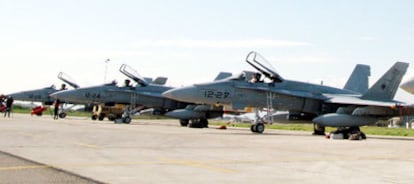Missile-carrying Spanish F18s poised to begin patrols across Libyan airspace
Congress expected to ratify Spain's participation in Odyssey Dawn operation
Four F18 fighter jets that left Torrejón de Ardoz airbase near Madrid on Saturday for their mission in Libya were still on standby at an Italian airbase in Decimomannu, Sardinia ready to help enforce a no-fly zone in the war-torn North African nation, a military official said Monday.
The jets had been reported ready for patrols across Libyan airspace Sunday but General Jaime Domínguez Buj, chief command of operations, explained that they won't be put into action until "it is determined that all of Libya's air defenses have been eliminated and that the no-fly zone can be enforced."
"The jets are ready and have been fully integrated with the other air forces of the coalition, and so they are ready to be put into action at any moment," Buj said.
The four F18s are now under the command of General Carter Ham, the US commander of Libyan mission who is based at Africom, with headquarters in Stuttgart, Germany. Their mission will be to patrol Libyan airspace, declared a no-flight zone by UN resolution 1,973 and will shoot down any airplane or helicopter that violates the UN prohibition, military sources said. The fighters are fitted with AMRAAM medium range air-to-air missiles as well as short-range Sidewinders, the sources say.
Although they are well-equipped, the Spanish F18s have not been charged as yet with destroying radars or any of Muammar Gaddafi's defense forces. Military officials said that a CN-235 tactical transport aircraft would also be sent to help in the patrols off the Libyan coast.
Spain is one of several countries playing a supporting role in a French, British and US-led coalition to prevent Gaddafi from using his military capability to attack rebels seeking to oust him from power. Spain has also offered the use of its Morón and Rota airbases for the operation.
On Sunday, a Spanish government source made the case for Madrid's participation in the Odyssey Dawn mission, saying that "Spain cannot sit idly by" and not help enforce the UN resolution. "Spain cannot turn its back on the international community and even less so when it concerns a Mediterranean country," the source told Efe news agency. Prime Minister José Luis Rodríguez Zapatero is scheduled to update Congress on Tuesday over Spain's role and seek formal parliamentary approval of his decision. With the exception of the United Left (IU) party, most of the country's political forces are expected to back the mission.
Speaking from the Balearic Islands, Popular Party secretary general María Dolores de Cospedal said that her group would "act responsibly" in the nation's interest but didn't reveal how it would vote.
Sources at the prime minister's La Moncloa residence point to article 17 of the 2005 National Defense Law, which states that Spain must act immediately when required to participate in international missions.
"When for reasons of extreme urgency it is not possible to obtain a prior consultation, the government must submit its decision to Congress as soon as possible so that it can ratify it," the article states.
On Sunday Foreign Minister Trinidad Jiménez said the length of Spanish involvement in the conflict would depend on Congress, but assured reporters that "it wouldn't be a long one."
"These are operations that will be decided at the right moment depending what the needs are and how the circumstances develop."
Zapatero's Socialist government has declined to predict whether the PP would stand with its deputies in approving the participation.
Ramón Jáuregui, Cabinet spokesman, said there can be no comparisons between this operation and Spain's intervention in Iraq during the previous Aznar-PP government. He said the differences between the 2003 Iraqi invasion and Libya are "enormous" because "for the first time the international community is in agreement."
Jáuregui added that in the case of Iraq, "only the Americans, the English and the PP were in agreement, without any support from the Arab world."
"This time there is coherence and responsibility on the part of Zapatero's government in defending the principles of democracy and the values of the United Nations," he said on Sunday.
Still, not all Spaniards are in agreement with their government's participation. In Madrid, IU supporters held a demonstration against Zapatero's economic policies as well as the Libyan mission. IU Congress member Gaspar Llamazares said he believed that there was a "geostrategic strategy to try to control and direct the changes that are taking place" in Libya.
In Barcelona, about 400 people at a demonstration held placards that read: "Neither NATO nor Gaddafi. Support the Libyan people" and "No more blood for oil."

Tu suscripción se está usando en otro dispositivo
¿Quieres añadir otro usuario a tu suscripción?
Si continúas leyendo en este dispositivo, no se podrá leer en el otro.
FlechaTu suscripción se está usando en otro dispositivo y solo puedes acceder a EL PAÍS desde un dispositivo a la vez.
Si quieres compartir tu cuenta, cambia tu suscripción a la modalidad Premium, así podrás añadir otro usuario. Cada uno accederá con su propia cuenta de email, lo que os permitirá personalizar vuestra experiencia en EL PAÍS.
¿Tienes una suscripción de empresa? Accede aquí para contratar más cuentas.
En el caso de no saber quién está usando tu cuenta, te recomendamos cambiar tu contraseña aquí.
Si decides continuar compartiendo tu cuenta, este mensaje se mostrará en tu dispositivo y en el de la otra persona que está usando tu cuenta de forma indefinida, afectando a tu experiencia de lectura. Puedes consultar aquí los términos y condiciones de la suscripción digital.








































